
The crazy upbringing, the success, the drink, the drugs, the four husbands. After all that, Emma Brockes expected Liza Minnelli to be a little dotty. But over lobster, endless cigarette breaks - and a mad dash without paying from the Plaza Hotel - she found a smart survivor with the motto 'If you have a bad memory of something, change it' Saturday April 12, 2008The Guardian
I look out for Liza Minnelli as I might for a lost balloon, scanning the restaurant for something small and bright, buffeted on all sides by gusts of recognition. In fact, she appears at the table via my blind spot, alone and on time, and slides into her seat without kerfuffle. We are at the Plaza Hotel, a New York landmark where Minnelli once lived with her family, and she is in at-home attire: casual black top, discreet silver cross, a huge handbag which she'll disappear into periodically in search of a lighter, and almost no make-up - not those great, fern-like lashes nor the white-lead-and-vinegar type face paint that makes her look so startling in photos. She appears younger than 62 and beneath the trembly speech - "Oh, thank you, darling," "Isn't this wonderful?", "Aren't we having fun?" - strikes me as quiet and rather watchful.
It's standard these days to portray Minnelli as dotty, as a woman who, once brilliant at enlivening complicated characters - Pookie Adams in The Sterile Cuckoo, Sally Bowles in Cabaret, Francine Evans in New York, New York - turned under pressure of
intolerable fame into someone whose sentences all end in exclamation marks. That she is talented in her own right has never changed the perception that whatever she does - go into showbiz, take drugs, become an alcoholic, win an Oscar, go into rehab, marry four times, win an Emmy, blow the roof off a concert venue - it is all completely inevitable. In interviews, Minnelli is more mindful than a politician of how her words might be used against her to prop up the image of Judy Garland's Tragic Daughter, which is why so many of her statements are either theatrically cheery or battily off-point. To that extent she has become victim of her own persona. But in concert, when she is speaking to her fans, she is more nuanced. In the current show, which is coming to Britain in May, she is the Minnelli of yore, full of sly self-awareness. (She tells a long story about the installation of three closets in her bedroom, which allows for an aside about what she found in them: "Two of my ex-husbands.") During the course of our lunch she hops between subjects, randomly cackling and trying to graft old anecdotes on to unrelated questions. But she is also smart, thoughtful and, at one point, so angry that she looks as if she could vaporise things with her eyes. In other words, relatively normal.
So here we are at the Plaza, where a waiter greets me on arrival with, "Miss Minnelli, welcome." It's that kind of afternoon. Minnelli has been touring on and off since 1965 and it's not tedious, she says, because "it's never the same people. I can always find someone who's going ..." She makes a sceptical face. "It's my job to get that person."
The week before, I had flown to Florida to watch her show at the Hard Rock hotel and casino, the kind of place the dead might choose to spend their holidays. The auditorium was empty in the upper rows, while the wheelchair bays on the ground floor were rammed, and everyone was dressed in diamanté-encrusted velour, like south Florida versions of the Pearly Kings. You could feel the tension before she came on. When Minnelli was performing the show in Sweden last year she collapsed after complaining of dizziness, and in the back of one's mind were those images of her from 2000, leaving hospital swollen and in a wheelchair after contracting encephalitis and being told she would never walk again. "She was always brilliant," said the woman sitting behind me. "Whether she's brilliant now ..."
When Minnelli finally came out she was slim, trim and shaking with nerves. Her motto has always been "Give the people what they want," and, despite a wobbly start, the performance was very good. She worked so hard that the sweat poured off her and, if the high notes were occasionally a journey of small stages, then the energy was thrilling. It didn't matter that the male backing singers looked like Ryanair cabin crew or that coquettish, as a rule, shouldn't be attempted by anyone older than 16½. It worked because she made it seem personal and because she wanted it so badly, even if a large part of her wanting it was a response to the audience wanting to see her want it, if you see what I mean.
Over lunch I say, "There seems to be lots of new material in the show."
"Thank you!" says Minnelli, and realises she has jumped the gun. "Did you enjoy it?"
Yes, very much.
"Thank you!" she says, and we're good to go.
The show is broken up by lots of banter and the new dialogue focuses on Minnelli's relationship with her godmother, Kay Thompson, the late actress and vocal arranger. She makes Thompson sound wonderful, full of wisecracks, life lessons and waspish asides, much as her mother used to come across when she still told stories about her. The anecdotes in the current show use Thompson as the main character and Judy Garland, who was her best friend, as a peripheral figure, in what I take to be a clever way for Minnelli to name-check her mother without over-egging it. But when I ask whether this is so, and whether the new dialogue is a correction to the usual miserable narrative about her, she won't have it.
"That show is who I am," she says. "That's what I've learned. That's my philosophy. That's who I am. And that's it! All the stories are true, that all happened ..." I can't figure out what she's upset about, and then I think: it's the suggestion that the stories she tells about her life are just another competing version, no more authoritative than the rest.
Our starters arrive, lobster bisque. Minnelli says it's nice to have lunch on her days off because she can't eat on the days she performs. "Nerves?"
"No, I have a hiatal hernia, which I got when I was pregnant and they put me upside down trying to hold the baby - and the baby passed away anyway - but I got a hernia, so if I eat and sing like that, and all that muscle, it hurts!" She laughs and I laugh and then we abruptly stop laughing and try to recalibrate. I think even Minnelli is unhappy with the way that sentence worked out. In a long-ago interview she talked about the great sadness of her three miscarriages and her regret at not having children. But the subjects revolve so quickly now that it's whipped away as soon as it has been raised and then we are talking about her singing; how a good cure for nerves is to formulate a character for the song, something she learned from Charles Aznavour. She was recently annoyed by the film about Edith Piaf, in which, she says, "they do what they usually do which is concentrate on the negative. I've heard such wonderfully funny things about Piaf, from Charles. She believed in creating a scandal before every opening. So she'd think of one and ..."
"Ladies ..."
We look up. A woman has materialised.
"I hope you don't mind. We were just talking about you and we think you're just marvellous."
"Thank you, dear," says Minnelli.
"But you gotta do more stuff! You are so talented and ..."
Minnelli says, "I'm working right now! I'm doing an interview, I'm working right this second!"
"But we want to see you more ..."
"Well, now is not the time," says Minnelli. She cackles to show she doesn't mean any harm. The lady smiles and ploughs on.
"I want to encourage you."
"Well, I'm touring all over the place. You gotta buy tickets."
"Well, we have, and I can't tell you how much we enjoyed it."
"Where are you from?"
"Poland."
"I played there, too."
The lady walks off and Minnelli mutters, "That was hilarious." Usually, she says, she hasn't the heart to tell people to go away. "I just fold." It was brave of her to approach us, I say, and Minnelli gives me a "Yeah, right" look. "A lot of people come and have life advice for me. It's a compliment. But instead of saying what they want to say - thank you - they come up with something that opens the door to a discussion. And you find you're stuck. It was a compliment but she put it in a negative way, so it demanded discussion."
The fire alarm goes off just then and, after tolerating the noise for a few seconds, Minnelli says, "Let's go and have a cigarette. Come on. What a great excuse to smoke!" As we cross the lobby someone calls, "Liza, you look fabulous!" "Thank you, honey!" and we walk out on to the hotel steps, where she lights up and says, "Let's sit right here."
At the end of the show in Florida she said, "My dahlings. Thank you. I love you! I love you all! You're my family! Everyone else is in the choir." She pointed up to the heavens. The crowd seemed delighted and a bit embarrassed.
After the show, the corridor outside the dressing rooms was full of stunned-looking couples in evening dress and men in leather jackets and big jewellery - none of whom, one hoped, she would end up marrying. One of the Ryanair boys came out and said, "There are four drag queens downstairs and one of 'em says he knows her."
"How'dz he know her?" growled Gary, Minnelli's manager.
"Says he played Kay Thompson's memorial service."
When Minnelli finally emerged she looked as if she'd been in a boxing match: black sweats, white towel round her neck, face liberated from stage make-up, cigarette in one wildly gesticulating hand. Crossing the corridor, she kept her eyes down before spotting her press agent and butting her head into his chest, like a little bull.
"Mustafa, darling, I ..."
"Amazing," said Mustafa, putting his hands on her shoulders. "You were amazing."
She lifted her eyes. "Oh, thank you, darling. I ... The new material ..."
"Just perfect."
Minnelli went to meet Gary's extended family and I went downstairs, where 30 people with green wristbands were being kept in a holding room. The steward told me they were VIPs.
"They don't look like VIPs."
He lowered his voice. "They're high rollers. They spend so much in the casino they get to meet all the artists."
Minnelli wouldn't be allowed to leave until she had been photographed shaking hands with every one of them in front of the Hard Rock logo.
"Why on earth would an artist go along with that?"
He looked at me as if I was very stupid indeed. "It's in their contracts."
Minnelli whooshed past my elbow just then. She was still vibrating and paused, for a second, to throw down her cigarette. "Kill that for me, will ya?" Then she threw on a smile and charged into the room.
Minnelli was a child when she lived at the Plaza with her mother and two siblings, in an era when they frequently moved between hotels. Garland would occasionally order them to put on all their clothes and do a midnight flit to avoid paying the bill. There was a time when Minnelli would light-heartedly talk about this and tell journalists that one of the first things she learned to do as a child was dial down for room service - if she hadn't done so, she'd have starved. But the wryness of her tone was lost in translation and she eventually replaced it, in interviews at least, with a blander positivity.
We are still sitting on the steps outside and Minnelli is talking about the children's books that Kay Thompson set here. She lived at the Plaza, too, and wrote about Eloise, a little girl living at the hotel who was partly based on her goddaughter. Minnelli's reading of Eloise is that she was "a kid, alone, in this huge hotel and she found ways to entertain herself. It is not a children's book - it's for adults..."
"Is it quite dark?"
"No. What is this with the dark? She understands how to entertain. All the kind of stuff... I'm doing an interview, I'm sorry."
Minnelli breaks off to address a man standing 10 feet from us with his mouth half open. He frowns at her. "You look different in person," he says.
"I'm sad to hear that," she says.
"No, younger," he says.
"Oh, well, thank you very much."
I tell her, "You've got amazing peripheral vision. I didn't even see that guy."
"Oh, yeah. I grew up watching, to protect Ma. You know. I can see them coming."
She drags on her cigarette.
It's annoying.
"No."
Come on. A little bit annoying.
"Not if they're nice. I mean, it's funny when they're opinionated, but at least they're coming over. My God, what if they didn't come over?"
What if they didn't come over?
"It wouldn't be working."
Her parents met on the set of Meet Me In St Louis, the 1944 MGM musical directed by Vincente Minnelli and starring a 22-year-old Garland, who, fresh from The Wizard Of Oz and all those Mickey Rooney pictures, was already hugely famous. They married and had a daughter, and when Garland hit upon a name for her she is said to have exclaimed, "Liza Minnelli! It'll look great on a marquee!" Liza's first film role was as "uncredited baby", carried on screen by her mother at the end of In The Good Old Summertime. She says that she wanted to be an ice-skater before she wanted to be a singer or an actor, but that didn't last long. Minnelli has tried over the years to defend her parents as funny and clever as well as dysfunctional, and to balance the stories of how, as a child, she hid Garland's pills and ran the household with a measure of comedy, fairer to the people involved. Her dad, she says, was "a real gent. He never bragged about anything." She was five when her parents divorced and after a period of stability in California was offered the choice of going to boarding school or accompanying her mother on tour. She chose the latter and has described it as both wonderful and awfully lonely. It was hard, she said, to hang on to friends when she changed schools so often.
Now she says that's nonsense; she still has lots of friends she made when she was four: "One of my best friends [from that era] is Jeanne Mockridge, daughter of Cyril Mockridge, who wrote the music for all the movies at Fox. I saw her last week in Florida. And the Levant kids were wonderful, Oscar Levant's kids." You wonder where these people were when David Gest came on the scene; you hope that, in the same position, your friends would stage an intervention or have you sectioned.
When Garland died of a drug overdose in 1969, Minnelli was 23 and already successful, the winner of a Tony Award for her role in the Broadway show Flora The Red Menace, and with a film, Charlie Bubbles, under her belt. She won her first Oscar nomination that year for her role as a smart, eccentric teenager in The Sterile Cuckoo - "Juno is today's Sterile Cuckoo," she says - and three years later won the award for Cabaret.
She talks about her mother's death in the show, about how Kay Thompson rang her that afternoon, although the two hadn't spoken for ages. "Momma died," said Minnelli, and Thompson said something like, "Oh honey, she always did everything she wanted to do. And she loved it all."
"There's a good side to all of it," Minnelli is saying. We are still on the steps. She is talking about life in general. "I think that's the greatest gift one can have: point of view. You know? I've come to believe that if you have a bad memory of something, change it." She reverberates with laughter.
How?
"Change it! Rewrite it for yourself and it becomes funny. It's up to you, how you feel, and what you look at and what you concentrate on. I honestly believe it's about balance. It's when everything gets a little cock-eyed that you go, 'Whoa, I've got to get balanced again.' If you don't like something, rewrite it."
So when does that become denial?
"I don't give a shit."
At the age of 21, Minnelli married Peter Allen, an actor and protege of her mother's, and they divorced seven years later. Allen died of an Aids-related illness in 1992. She was then married to Jack Haley Jr, son of the actor who played the Tin Man in The Wizard Of Oz, for five years, and then to Mark Gero, a stage manager and artist, for 13 years. And then in 2002 she married David Gest, in a ceremony no one who has seen the photos can ever forget. The marriage broke down a year later amid such lurid accusations and counter-accusations that I realise, suddenly, I don't believe any of it. I assume Minnelli will have a pat response and so it is quite innocently that, after she has said, "Your point of view is up to you and it can save your life," I ask, by that logic, how far are you into the process of reconstituting the memory of your last marriage?
I have never felt the tone of an interview change so sharply. Minnelli's eyes seem to darken and she turns away. When she turns back her face is livid. Needlessly, I add, "Can you laugh at it yet?"
She hisses, "It doesn't exist."
But you joke about it in the show? In the prelude to a song from Chicago she says something like, "This is sung by a woman who murders her husband. I know how she felt." It gets a big laugh. So...
"No comment."
Well, except that ...
"I said ..."
But ...
"I said, no comment."
But you put it in the show.
"No comment. What I said in the show I said in the show. That's it."
We sit there in silence.
I say, you know David Gest is a big thing in England, he's a cult figure there, since ... "I don't care," she says, and her voice is all the scarier for being quiet - seething rather than shouting. "You wanna talk about something that I like, we'll talk about it. I don't talk about that. It's a decision I made and I keep to it." She points to a man passing by. "Look, nice coat." And, just like that, she moves on.
We get up to go inside, meet more admirers in the lobby ("Thank you, thank you, so much. No, I'm doing an interview, nice to see you. Oh, I remember you - nice to see you"), return to the table, talk about Tony Bennett ("He's a good friend"), and then the fire alarm goes off again. I swear. Minnelli says, "We could split. You wanna split? Let's go."
We gather up our stuff and walk towards the door. "Hang on," I say. "I have to pay the bill." Minnelli looks at me as if I've taken leave of my senses. "No! You don't pay when that happens, when they burst your eardrums. This is the Plaza."
She gives a little wave to the waiter, whose mouth starts to become unhinged, calls, "Bye, dear! We'll be back another time!", grabs me firmly by the elbow and wheels us towards the exit. "Come," she says. And out we go.
Five minutes later we're looking in the window of a jewellery store. Minnelli points at some earrings. "Beautiful. Can you see the woman's face if she received those from somebody? If someone fabulous gave them to her?" Gest was a buyer of ostentatious jewellery for his wife, usually when a camera crew was around to film him doing it. I ask what her favourite piece of jewellery is and she says, "Actually, I've decided that I am totally against jewellery. So I have all fake. There's no reason to have real diamonds. People think it's real anyway."
We walk into Cipriani's. "Buon giorno, Carlo, nice to see you. It's Miss Minnelli, for two." She tells me she is going to Mexico in a few weeks, to see her half-sister on her father's side, Christiane Nina Minnelli. "My father used to call her Tina Nina. She's wonderful." On her mother's side she has a half-brother, Joey, who is a photographer, and a half-sister, Lorna, a singer, both children of Garland's third husband, Sid Luft. Lorna occasionally stands in when Minnelli is unavailable, or unaffordable, and this raises inevitable tensions. Years ago she gave a pious interview to 60 Minutes in which she implied that Minnelli was too self-destructive, at that point, to have a relationship with, but that the "door is always open".
Wasn't Lorna on stage recently?
"Huh? Yes. She's doing great work."
It was in Rufus Wainwright's show, where he recreated Garland's legendary 1961 Carnegie Hall concert. In her own shows, when Minnelli is asked to sing Over The Rainbow, she calls back, "Oh, honey, that's been sung." Wainwright sings it, however, and so does Lorna Luft. Minnelli says, "I didn't understand [the Wainwright show]. But, that's my problem, if I didn't understand." She says, "As long as she enjoyed it, that's fine."
"Now," she says, "Shall we have a dessert or something luscious?"
The paucity of parts for women over a certain age in Hollywood has been made up for, to some extent, in television, and Minnelli is an unlikely beneficiary. She won an Emmy in 1972 for Liza With A 'Z', a televised concert directed by Bob Fosse and still amazing today - fiercely original, wonderfully choreographed, sexy and funny, without a whiff of mawkishness. And she returned to TV a few years ago in the brilliant comedy Arrested Development, as Lucille Austero, a mentally disordered woman trying to lick herself into shape for a mentally disordered man. It was a reminder of what a fine comic she is. Lucille had such bad vertigo she had to cling to the walls even at ground level. "When we were creating the character I said, I think she falls down a lot - that when she's upset, her balance goes."
We clear our plates of huge desserts. Licking the last crumb, Minnelli says, "Well, I hated that, as you can see."
I ask what her favourite songs are and she says, a little sadly, "the ones written for me". For many years she was the muse of Kander and Ebb, and there's a song she sings from Chicago called Nowadays, which she performed 30 years ago under Fosse's direction. It's striking for its ferocity and the way she sang the happy lyrics - "Isn't it good, isn't it great?" - with such anger and despair.
"When Fosse directed you, you always had a subtext. Always. He'd see what you came up with, then he knew how to guide you."
In Rob Marshall's film version of Chicago, Renée Zellweger sings the song as a jolly number, with - if we're being generous - a subtext of damp wistfulness. But Minnelli played the Roxie Hart of the original stage version, who unlike her counterpart in the film was a failure to the end. "In the play she never becomes a hit," says Minnelli. "She's just in cheap houses, the jailhouse circuit." Her version of the song is pushed through gritted teeth until it becomes, finally, halfway hopeful. As we wait, this time, for the bill, she explains, "She's been through this rotten circus and she's thrown in jail and she's singing, "It's good, isn't it great?" A quiet smile. "It's the irony."
· Liza Minnelli's UK tour starts on May 25 at the London Coliseum
intolerable fame into someone whose sentences all end in exclamation marks. That she is talented in her own right has never changed the perception that whatever she does - go into showbiz, take drugs, become an alcoholic, win an Oscar, go into rehab, marry four times, win an Emmy, blow the roof off a concert venue - it is all completely inevitable. In interviews, Minnelli is more mindful than a politician of how her words might be used against her to prop up the image of Judy Garland's Tragic Daughter, which is why so many of her statements are either theatrically cheery or battily off-point. To that extent she has become victim of her own persona. But in concert, when she is speaking to her fans, she is more nuanced. In the current show, which is coming to Britain in May, she is the Minnelli of yore, full of sly self-awareness. (She tells a long story about the installation of three closets in her bedroom, which allows for an aside about what she found in them: "Two of my ex-husbands.") During the course of our lunch she hops between subjects, randomly cackling and trying to graft old anecdotes on to unrelated questions. But she is also smart, thoughtful and, at one point, so angry that she looks as if she could vaporise things with her eyes. In other words, relatively normal.
So here we are at the Plaza, where a waiter greets me on arrival with, "Miss Minnelli, welcome." It's that kind of afternoon. Minnelli has been touring on and off since 1965 and it's not tedious, she says, because "it's never the same people. I can always find someone who's going ..." She makes a sceptical face. "It's my job to get that person."
The week before, I had flown to Florida to watch her show at the Hard Rock hotel and casino, the kind of place the dead might choose to spend their holidays. The auditorium was empty in the upper rows, while the wheelchair bays on the ground floor were rammed, and everyone was dressed in diamanté-encrusted velour, like south Florida versions of the Pearly Kings. You could feel the tension before she came on. When Minnelli was performing the show in Sweden last year she collapsed after complaining of dizziness, and in the back of one's mind were those images of her from 2000, leaving hospital swollen and in a wheelchair after contracting encephalitis and being told she would never walk again. "She was always brilliant," said the woman sitting behind me. "Whether she's brilliant now ..."
When Minnelli finally came out she was slim, trim and shaking with nerves. Her motto has always been "Give the people what they want," and, despite a wobbly start, the performance was very good. She worked so hard that the sweat poured off her and, if the high notes were occasionally a journey of small stages, then the energy was thrilling. It didn't matter that the male backing singers looked like Ryanair cabin crew or that coquettish, as a rule, shouldn't be attempted by anyone older than 16½. It worked because she made it seem personal and because she wanted it so badly, even if a large part of her wanting it was a response to the audience wanting to see her want it, if you see what I mean.
Over lunch I say, "There seems to be lots of new material in the show."
"Thank you!" says Minnelli, and realises she has jumped the gun. "Did you enjoy it?"
Yes, very much.
"Thank you!" she says, and we're good to go.
The show is broken up by lots of banter and the new dialogue focuses on Minnelli's relationship with her godmother, Kay Thompson, the late actress and vocal arranger. She makes Thompson sound wonderful, full of wisecracks, life lessons and waspish asides, much as her mother used to come across when she still told stories about her. The anecdotes in the current show use Thompson as the main character and Judy Garland, who was her best friend, as a peripheral figure, in what I take to be a clever way for Minnelli to name-check her mother without over-egging it. But when I ask whether this is so, and whether the new dialogue is a correction to the usual miserable narrative about her, she won't have it.
"That show is who I am," she says. "That's what I've learned. That's my philosophy. That's who I am. And that's it! All the stories are true, that all happened ..." I can't figure out what she's upset about, and then I think: it's the suggestion that the stories she tells about her life are just another competing version, no more authoritative than the rest.
Our starters arrive, lobster bisque. Minnelli says it's nice to have lunch on her days off because she can't eat on the days she performs. "Nerves?"
"No, I have a hiatal hernia, which I got when I was pregnant and they put me upside down trying to hold the baby - and the baby passed away anyway - but I got a hernia, so if I eat and sing like that, and all that muscle, it hurts!" She laughs and I laugh and then we abruptly stop laughing and try to recalibrate. I think even Minnelli is unhappy with the way that sentence worked out. In a long-ago interview she talked about the great sadness of her three miscarriages and her regret at not having children. But the subjects revolve so quickly now that it's whipped away as soon as it has been raised and then we are talking about her singing; how a good cure for nerves is to formulate a character for the song, something she learned from Charles Aznavour. She was recently annoyed by the film about Edith Piaf, in which, she says, "they do what they usually do which is concentrate on the negative. I've heard such wonderfully funny things about Piaf, from Charles. She believed in creating a scandal before every opening. So she'd think of one and ..."
"Ladies ..."
We look up. A woman has materialised.
"I hope you don't mind. We were just talking about you and we think you're just marvellous."
"Thank you, dear," says Minnelli.
"But you gotta do more stuff! You are so talented and ..."
Minnelli says, "I'm working right now! I'm doing an interview, I'm working right this second!"
"But we want to see you more ..."
"Well, now is not the time," says Minnelli. She cackles to show she doesn't mean any harm. The lady smiles and ploughs on.
"I want to encourage you."
"Well, I'm touring all over the place. You gotta buy tickets."
"Well, we have, and I can't tell you how much we enjoyed it."
"Where are you from?"
"Poland."
"I played there, too."
The lady walks off and Minnelli mutters, "That was hilarious." Usually, she says, she hasn't the heart to tell people to go away. "I just fold." It was brave of her to approach us, I say, and Minnelli gives me a "Yeah, right" look. "A lot of people come and have life advice for me. It's a compliment. But instead of saying what they want to say - thank you - they come up with something that opens the door to a discussion. And you find you're stuck. It was a compliment but she put it in a negative way, so it demanded discussion."
The fire alarm goes off just then and, after tolerating the noise for a few seconds, Minnelli says, "Let's go and have a cigarette. Come on. What a great excuse to smoke!" As we cross the lobby someone calls, "Liza, you look fabulous!" "Thank you, honey!" and we walk out on to the hotel steps, where she lights up and says, "Let's sit right here."
At the end of the show in Florida she said, "My dahlings. Thank you. I love you! I love you all! You're my family! Everyone else is in the choir." She pointed up to the heavens. The crowd seemed delighted and a bit embarrassed.
After the show, the corridor outside the dressing rooms was full of stunned-looking couples in evening dress and men in leather jackets and big jewellery - none of whom, one hoped, she would end up marrying. One of the Ryanair boys came out and said, "There are four drag queens downstairs and one of 'em says he knows her."
"How'dz he know her?" growled Gary, Minnelli's manager.
"Says he played Kay Thompson's memorial service."
When Minnelli finally emerged she looked as if she'd been in a boxing match: black sweats, white towel round her neck, face liberated from stage make-up, cigarette in one wildly gesticulating hand. Crossing the corridor, she kept her eyes down before spotting her press agent and butting her head into his chest, like a little bull.
"Mustafa, darling, I ..."
"Amazing," said Mustafa, putting his hands on her shoulders. "You were amazing."
She lifted her eyes. "Oh, thank you, darling. I ... The new material ..."
"Just perfect."
Minnelli went to meet Gary's extended family and I went downstairs, where 30 people with green wristbands were being kept in a holding room. The steward told me they were VIPs.
"They don't look like VIPs."
He lowered his voice. "They're high rollers. They spend so much in the casino they get to meet all the artists."
Minnelli wouldn't be allowed to leave until she had been photographed shaking hands with every one of them in front of the Hard Rock logo.
"Why on earth would an artist go along with that?"
He looked at me as if I was very stupid indeed. "It's in their contracts."
Minnelli whooshed past my elbow just then. She was still vibrating and paused, for a second, to throw down her cigarette. "Kill that for me, will ya?" Then she threw on a smile and charged into the room.
Minnelli was a child when she lived at the Plaza with her mother and two siblings, in an era when they frequently moved between hotels. Garland would occasionally order them to put on all their clothes and do a midnight flit to avoid paying the bill. There was a time when Minnelli would light-heartedly talk about this and tell journalists that one of the first things she learned to do as a child was dial down for room service - if she hadn't done so, she'd have starved. But the wryness of her tone was lost in translation and she eventually replaced it, in interviews at least, with a blander positivity.
We are still sitting on the steps outside and Minnelli is talking about the children's books that Kay Thompson set here. She lived at the Plaza, too, and wrote about Eloise, a little girl living at the hotel who was partly based on her goddaughter. Minnelli's reading of Eloise is that she was "a kid, alone, in this huge hotel and she found ways to entertain herself. It is not a children's book - it's for adults..."
"Is it quite dark?"
"No. What is this with the dark? She understands how to entertain. All the kind of stuff... I'm doing an interview, I'm sorry."
Minnelli breaks off to address a man standing 10 feet from us with his mouth half open. He frowns at her. "You look different in person," he says.
"I'm sad to hear that," she says.
"No, younger," he says.
"Oh, well, thank you very much."
I tell her, "You've got amazing peripheral vision. I didn't even see that guy."
"Oh, yeah. I grew up watching, to protect Ma. You know. I can see them coming."
She drags on her cigarette.
It's annoying.
"No."
Come on. A little bit annoying.
"Not if they're nice. I mean, it's funny when they're opinionated, but at least they're coming over. My God, what if they didn't come over?"
What if they didn't come over?
"It wouldn't be working."
Her parents met on the set of Meet Me In St Louis, the 1944 MGM musical directed by Vincente Minnelli and starring a 22-year-old Garland, who, fresh from The Wizard Of Oz and all those Mickey Rooney pictures, was already hugely famous. They married and had a daughter, and when Garland hit upon a name for her she is said to have exclaimed, "Liza Minnelli! It'll look great on a marquee!" Liza's first film role was as "uncredited baby", carried on screen by her mother at the end of In The Good Old Summertime. She says that she wanted to be an ice-skater before she wanted to be a singer or an actor, but that didn't last long. Minnelli has tried over the years to defend her parents as funny and clever as well as dysfunctional, and to balance the stories of how, as a child, she hid Garland's pills and ran the household with a measure of comedy, fairer to the people involved. Her dad, she says, was "a real gent. He never bragged about anything." She was five when her parents divorced and after a period of stability in California was offered the choice of going to boarding school or accompanying her mother on tour. She chose the latter and has described it as both wonderful and awfully lonely. It was hard, she said, to hang on to friends when she changed schools so often.
Now she says that's nonsense; she still has lots of friends she made when she was four: "One of my best friends [from that era] is Jeanne Mockridge, daughter of Cyril Mockridge, who wrote the music for all the movies at Fox. I saw her last week in Florida. And the Levant kids were wonderful, Oscar Levant's kids." You wonder where these people were when David Gest came on the scene; you hope that, in the same position, your friends would stage an intervention or have you sectioned.
When Garland died of a drug overdose in 1969, Minnelli was 23 and already successful, the winner of a Tony Award for her role in the Broadway show Flora The Red Menace, and with a film, Charlie Bubbles, under her belt. She won her first Oscar nomination that year for her role as a smart, eccentric teenager in The Sterile Cuckoo - "Juno is today's Sterile Cuckoo," she says - and three years later won the award for Cabaret.
She talks about her mother's death in the show, about how Kay Thompson rang her that afternoon, although the two hadn't spoken for ages. "Momma died," said Minnelli, and Thompson said something like, "Oh honey, she always did everything she wanted to do. And she loved it all."
"There's a good side to all of it," Minnelli is saying. We are still on the steps. She is talking about life in general. "I think that's the greatest gift one can have: point of view. You know? I've come to believe that if you have a bad memory of something, change it." She reverberates with laughter.
How?
"Change it! Rewrite it for yourself and it becomes funny. It's up to you, how you feel, and what you look at and what you concentrate on. I honestly believe it's about balance. It's when everything gets a little cock-eyed that you go, 'Whoa, I've got to get balanced again.' If you don't like something, rewrite it."
So when does that become denial?
"I don't give a shit."
At the age of 21, Minnelli married Peter Allen, an actor and protege of her mother's, and they divorced seven years later. Allen died of an Aids-related illness in 1992. She was then married to Jack Haley Jr, son of the actor who played the Tin Man in The Wizard Of Oz, for five years, and then to Mark Gero, a stage manager and artist, for 13 years. And then in 2002 she married David Gest, in a ceremony no one who has seen the photos can ever forget. The marriage broke down a year later amid such lurid accusations and counter-accusations that I realise, suddenly, I don't believe any of it. I assume Minnelli will have a pat response and so it is quite innocently that, after she has said, "Your point of view is up to you and it can save your life," I ask, by that logic, how far are you into the process of reconstituting the memory of your last marriage?
I have never felt the tone of an interview change so sharply. Minnelli's eyes seem to darken and she turns away. When she turns back her face is livid. Needlessly, I add, "Can you laugh at it yet?"
She hisses, "It doesn't exist."
But you joke about it in the show? In the prelude to a song from Chicago she says something like, "This is sung by a woman who murders her husband. I know how she felt." It gets a big laugh. So...
"No comment."
Well, except that ...
"I said ..."
But ...
"I said, no comment."
But you put it in the show.
"No comment. What I said in the show I said in the show. That's it."
We sit there in silence.
I say, you know David Gest is a big thing in England, he's a cult figure there, since ... "I don't care," she says, and her voice is all the scarier for being quiet - seething rather than shouting. "You wanna talk about something that I like, we'll talk about it. I don't talk about that. It's a decision I made and I keep to it." She points to a man passing by. "Look, nice coat." And, just like that, she moves on.
We get up to go inside, meet more admirers in the lobby ("Thank you, thank you, so much. No, I'm doing an interview, nice to see you. Oh, I remember you - nice to see you"), return to the table, talk about Tony Bennett ("He's a good friend"), and then the fire alarm goes off again. I swear. Minnelli says, "We could split. You wanna split? Let's go."
We gather up our stuff and walk towards the door. "Hang on," I say. "I have to pay the bill." Minnelli looks at me as if I've taken leave of my senses. "No! You don't pay when that happens, when they burst your eardrums. This is the Plaza."
She gives a little wave to the waiter, whose mouth starts to become unhinged, calls, "Bye, dear! We'll be back another time!", grabs me firmly by the elbow and wheels us towards the exit. "Come," she says. And out we go.
Five minutes later we're looking in the window of a jewellery store. Minnelli points at some earrings. "Beautiful. Can you see the woman's face if she received those from somebody? If someone fabulous gave them to her?" Gest was a buyer of ostentatious jewellery for his wife, usually when a camera crew was around to film him doing it. I ask what her favourite piece of jewellery is and she says, "Actually, I've decided that I am totally against jewellery. So I have all fake. There's no reason to have real diamonds. People think it's real anyway."
We walk into Cipriani's. "Buon giorno, Carlo, nice to see you. It's Miss Minnelli, for two." She tells me she is going to Mexico in a few weeks, to see her half-sister on her father's side, Christiane Nina Minnelli. "My father used to call her Tina Nina. She's wonderful." On her mother's side she has a half-brother, Joey, who is a photographer, and a half-sister, Lorna, a singer, both children of Garland's third husband, Sid Luft. Lorna occasionally stands in when Minnelli is unavailable, or unaffordable, and this raises inevitable tensions. Years ago she gave a pious interview to 60 Minutes in which she implied that Minnelli was too self-destructive, at that point, to have a relationship with, but that the "door is always open".
Wasn't Lorna on stage recently?
"Huh? Yes. She's doing great work."
It was in Rufus Wainwright's show, where he recreated Garland's legendary 1961 Carnegie Hall concert. In her own shows, when Minnelli is asked to sing Over The Rainbow, she calls back, "Oh, honey, that's been sung." Wainwright sings it, however, and so does Lorna Luft. Minnelli says, "I didn't understand [the Wainwright show]. But, that's my problem, if I didn't understand." She says, "As long as she enjoyed it, that's fine."
"Now," she says, "Shall we have a dessert or something luscious?"
The paucity of parts for women over a certain age in Hollywood has been made up for, to some extent, in television, and Minnelli is an unlikely beneficiary. She won an Emmy in 1972 for Liza With A 'Z', a televised concert directed by Bob Fosse and still amazing today - fiercely original, wonderfully choreographed, sexy and funny, without a whiff of mawkishness. And she returned to TV a few years ago in the brilliant comedy Arrested Development, as Lucille Austero, a mentally disordered woman trying to lick herself into shape for a mentally disordered man. It was a reminder of what a fine comic she is. Lucille had such bad vertigo she had to cling to the walls even at ground level. "When we were creating the character I said, I think she falls down a lot - that when she's upset, her balance goes."
We clear our plates of huge desserts. Licking the last crumb, Minnelli says, "Well, I hated that, as you can see."
I ask what her favourite songs are and she says, a little sadly, "the ones written for me". For many years she was the muse of Kander and Ebb, and there's a song she sings from Chicago called Nowadays, which she performed 30 years ago under Fosse's direction. It's striking for its ferocity and the way she sang the happy lyrics - "Isn't it good, isn't it great?" - with such anger and despair.
"When Fosse directed you, you always had a subtext. Always. He'd see what you came up with, then he knew how to guide you."
In Rob Marshall's film version of Chicago, Renée Zellweger sings the song as a jolly number, with - if we're being generous - a subtext of damp wistfulness. But Minnelli played the Roxie Hart of the original stage version, who unlike her counterpart in the film was a failure to the end. "In the play she never becomes a hit," says Minnelli. "She's just in cheap houses, the jailhouse circuit." Her version of the song is pushed through gritted teeth until it becomes, finally, halfway hopeful. As we wait, this time, for the bill, she explains, "She's been through this rotten circus and she's thrown in jail and she's singing, "It's good, isn't it great?" A quiet smile. "It's the irony."
· Liza Minnelli's UK tour starts on May 25 at the London Coliseum















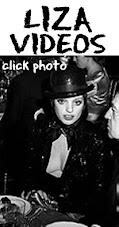


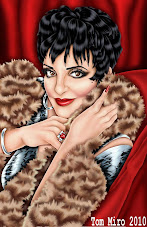

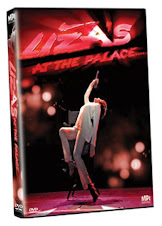











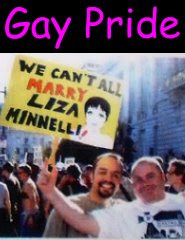










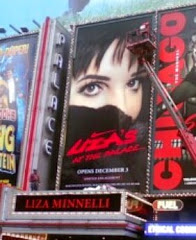



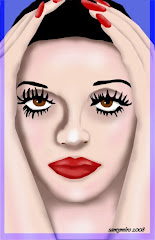
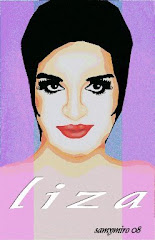


























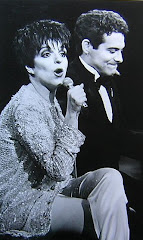


































No comments:
Post a Comment